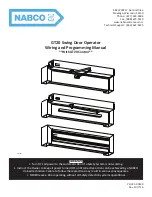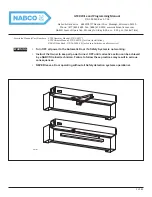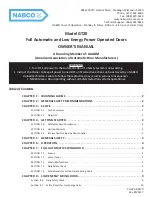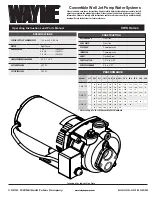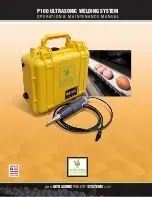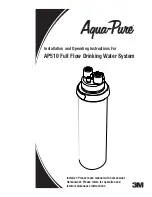
V1.0
180 MULTI-PROCESS MIG-ARC-TIG WELDER
8611311
Visit www.princessauto.com for more information
25
THORIATED
(Colour Code: Red)
WARNING! Thoriated tungsten should not come in contact with open cuts or wounds. The
more significant danger to welders can occur when thorium oxide gets into the lungs. This
can happen from the exposure to vapours during welding or from ingestion of material/dust
in the grinding of the tungsten. Follow the manufacturer’s warnings, instructions and the
Safety Data Sheet (SDS) for its use.
Thoriated tungsten electrodes (AWS classification EWTh-2) contain a minimum of 97.30%
tungsten and 1.70 to 2.20% thorium and are called 2% thoriated. They are the most commonly
used electrodes today and are preferred for their longevity and ease of use. Thorium increases
the electron emission qualities of the electrode, which improves arc starts and allows for a
higher current-carrying capacity. This electrode operates far below its melting temperature,
which results in a considerably lower rate of consumption and eliminates arc wandering for
greater stability. Compared with other electrodes, thoriated electrodes deposit less tungsten
into the weld puddle, so they cause less weld contamination.
However, thorium is a low-level radioactive hazard and many users have switched to other alternatives.
Regarding the radioactivity, thorium is an alpha emitter, but when it is enclosed in a tungsten
matrix the risks are negligible. Thus holding a stick of Thoriated tungsten in your hand should
not pose a great threat unless a welder has open cuts on their skin.
CERIATED
(Colour Code: Orange)
Ceriated tungsten electrodes (AWS classification EWCe-2) contain a minimum of 97.30% tungsten
and 1.80 to 2.20% cerium and are referred to as 2% ceriated. Ceriated tungsten’s perform best in DC
welding at low current settings. They have excellent arc starts at low amperages and become popular
in such applications as orbital tube welding, thin sheet metal work. They are best used to weld
carbon steel, stainless steel, nickel alloys and titanium and in some cases it can replace 2% thoriated
electrodes. Ceriated tungsten is best suited for lower amperages it should last longer than Thoriated
tungsten higher amperage applications are best left to Thoriated or Lanthanated tungsten.
LANTHANATED
(Colour Code: Gold)
Lanthanated tungsten electrodes (AWS classification EWLa-1.5) contain a minimum of 97.80%
tungsten and 1.30% to 1.70% lanthanum and are known as 1.5% lanthanated. These electrodes have
excellent arc starting, a low burn off rate, good arc stability and excellent reignition characteristics.
Lanthanated tungsten also shares the conductivity characteristics of 2% thoriated tungsten.
Lanthanated tungsten electrodes are ideal if you want to optimize your welding capabilities. They
work well on AC or DC electrode negative with a pointed end, or they can be balled for use with
AC sine wave power sources. Lanthanated tungsten maintains a sharpened point well, which is an
advantage for welding steel and stainless steel on DC or AC from square wave power sources.
ZIRCONIATED
(Colour Code: White)
Zirconiated tungsten electrodes (AWS classification EWZr-1) contain a minimum of 99.10% tungsten
and 0.15 to 0.40% zirconium. Most commonly used for AC welding Zirconiated tungsten produces a
very stable arc and is resistant to tungsten spitting. It is ideal for AC welding because it retains a
balled tip and has a high resistance to contamination. Its current-carrying capacity is equal to or
greater than that of thoriated tungsten. Zirconiated tungsten is not recommended for DC welding.
TUNGSTEN ELECTRODES RATING FOR WELDING CURRENTS
TUNGSTEN DIAMETER
DC CURRENT AMPS TORCH
NEGATIVE 2% THORIATED
AC CURRENT AMPS UNBALANCED
WAVE 0.8% ZIRCONIATED
AC CURRENT AMPS BALANCED
WAVE 0.8% ZIRCONIATED
3/64 in. (1.2 mm)
15 – 80A
15 – 80A
20 – 60A
1/16 in. (1.6 mm)
70 -150A
70 – 150A
60 – 120A
3/32 in. (2.4 mm)
150- 250A
140 – 235A
100 – 180A
1/8 in. (3.2 mm)
250 – 400A
225 – 325A
160 – 250A
5/32 in. (3.9 mm)
400 – 500A
300 – 400A
200 – 320A
Table 4

































